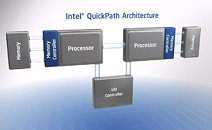Wednesday, January 27th 2010

Core i7 Dual-Socket Operation Possible?
Intel's Core i7 processor in the LGA1366 package is currently leading in the performance front, some of the fastest processors for the desktop platform fall in this league. Despite lacking a directly competitive processor, the platform had its share of competition thanks to motherboard manufacturers competing within themselves. EVGA for one, is set to unveil a bleeding-edge motherboard later this year, which supports two LGA1366 processors. So far, enthusiasts working for EVGA have only disclosed that the motherboard would work with Intel's DP Xeon 5000 series LGA1366 processors, which are officially capable of working on dual-socket server and workstation motherboards.
However, a plausible rumor doing rounds has it that EVGA may attempt to make its motherboard work with Core i7 series processors - which are incapable to operate in pairs, at least from what we're led to believe. EVGA is attempting to do this by modifying the reference Intel design for the platform.
To begin with, Intel with use the 5500 series IO hub instead of X58 Express. A BIOS modification on the QuickPath Interconnect routing table will connect Processor1 to Processor2 via the IO hub, in absence of a physical QPI link between the two CPU sockets (enabled on the Xeon DP processors). This approach, while making the setup possible, also increases system interconnect latencies almost two-fold.The approach could cut platform costs at a theoretical performance penalty, letting you use Core i7 or the cheaper Xeon UP processors. Use of Xeon DP processors could then still make for a good buy, if performance at any cost matters. Much like Intel's previous attempt at a dual-socket capable processor from the Core family (Core 2 Extreme QX9775), a real DP capable Core processor cannot be written off.
There is no comment yet from EVGA, in this regard.With inputs from Semi-Accurate.
However, a plausible rumor doing rounds has it that EVGA may attempt to make its motherboard work with Core i7 series processors - which are incapable to operate in pairs, at least from what we're led to believe. EVGA is attempting to do this by modifying the reference Intel design for the platform.
To begin with, Intel with use the 5500 series IO hub instead of X58 Express. A BIOS modification on the QuickPath Interconnect routing table will connect Processor1 to Processor2 via the IO hub, in absence of a physical QPI link between the two CPU sockets (enabled on the Xeon DP processors). This approach, while making the setup possible, also increases system interconnect latencies almost two-fold.The approach could cut platform costs at a theoretical performance penalty, letting you use Core i7 or the cheaper Xeon UP processors. Use of Xeon DP processors could then still make for a good buy, if performance at any cost matters. Much like Intel's previous attempt at a dual-socket capable processor from the Core family (Core 2 Extreme QX9775), a real DP capable Core processor cannot be written off.
There is no comment yet from EVGA, in this regard.With inputs from Semi-Accurate.

21 Comments on Core i7 Dual-Socket Operation Possible?
I had one. It was quite cheap (same as any other 440BX board) and buying two Celeron would cost less than a same speed Pentium 2 by then.
Unfortunately, having 2 CPUs by then wasn't useful at all, during the board's lifetime.
But hey, I was happy with it :P
Of course, this LGA1366 board will never be marketed towards budget systems..
This was actually first reported by me from CES an hour after being the first person to see the board hands-on, here: www.techreaction.net/2010/01/07/exclusive-new-evga-classified-dual-proc-board-270-gt-w555/
You guys definitely extrapolated on this, but S|A shouldn't be acting like they got the scoop.
Now spending 400+800 in a dual socket processing monster would be a lot more appealing to potential customers like myself
440BX dual Pentium III 550 mhz ;D
now evga try to make corei7 working with another core i7
i believe it possible.
hopefully someone try to make intel cpu working with amd cpu,:):):)
to keep manufacturing costs down intel produces a single wafer of CPU cores and IOH cores, as they have for many years.
these cores are then divided and placed into their respectable packages.
xeons and i7s are all the same die.
what sets them apart is the xeon 5XXX series has 2 QPIs while the i7's and 3XXX series xeons get 1 QPI disabled.
this is also true with the intel 5520 server chipset which is used on the evga dual socket motherboard. it has 2 QPI links while the desktop counterpart x58 chipset is a neutered 5520 IOH chip that lacks the 2nd QPI link.
by disabling the 2nd QPI on both the CPU and IOH you also loose features that require the use of the 2nd QPI such as Intel Virtualization Technology for Directed I/O which wouldnt make a huge difference on x58.
Right now it would be a complete destruction of R&D resources.
I wonder how much of a performance hit we are talking about though, it can't be that bad compared to the drastic savings.
Though I also have to ask myself how many people buying this board will actually be worried about the cost savings...:laugh:
I had dreams about the Thunder 100 and Thunder X...
were so much fun back in the day, I had a Tyan Tomcat with dual P166MMX processors. Woot